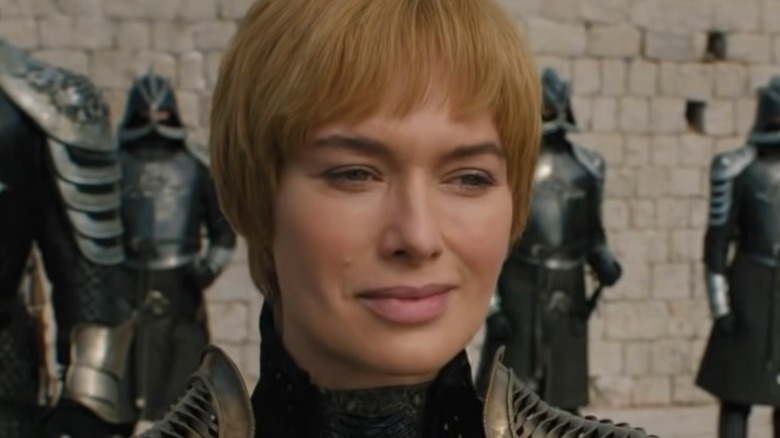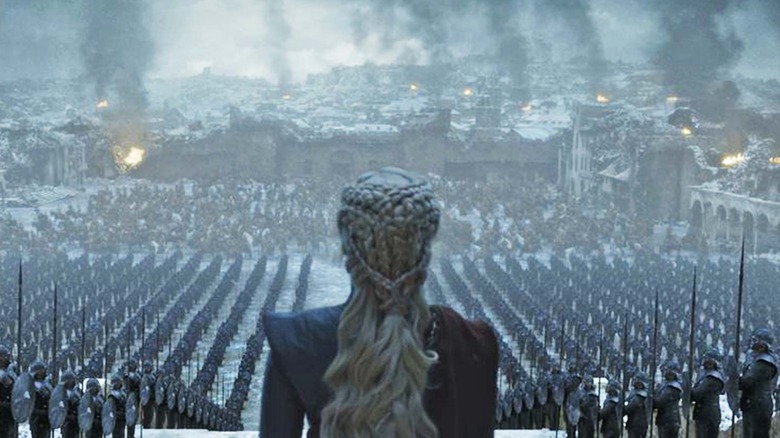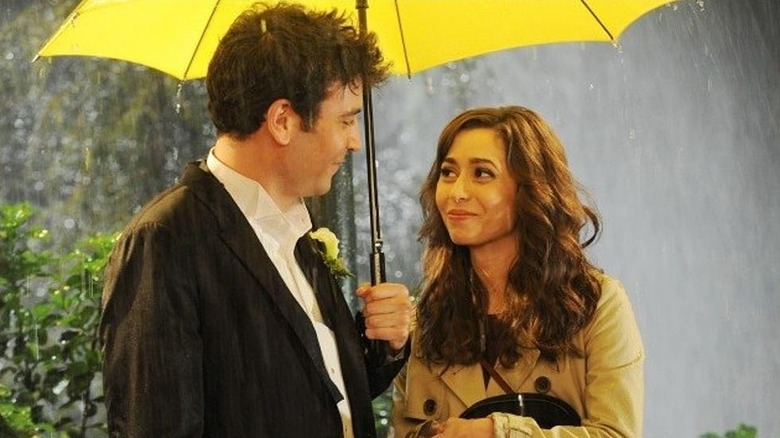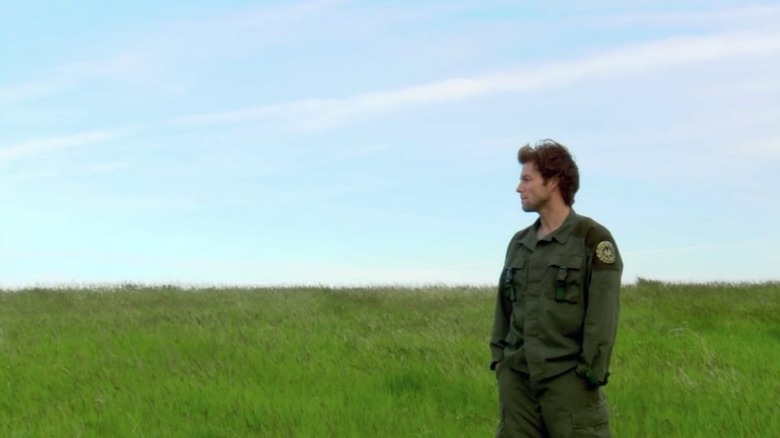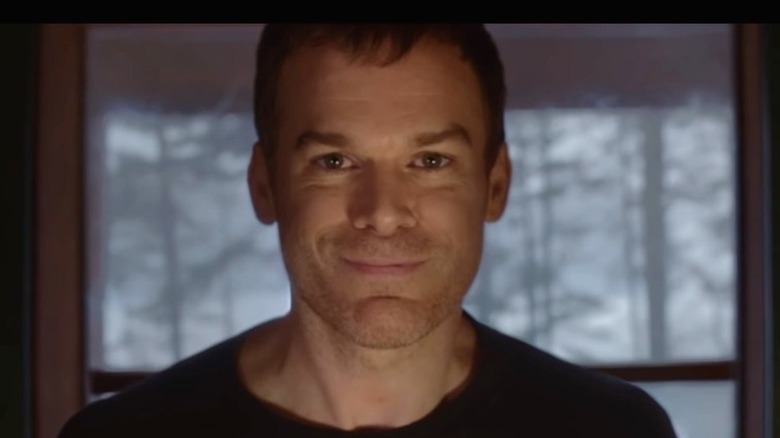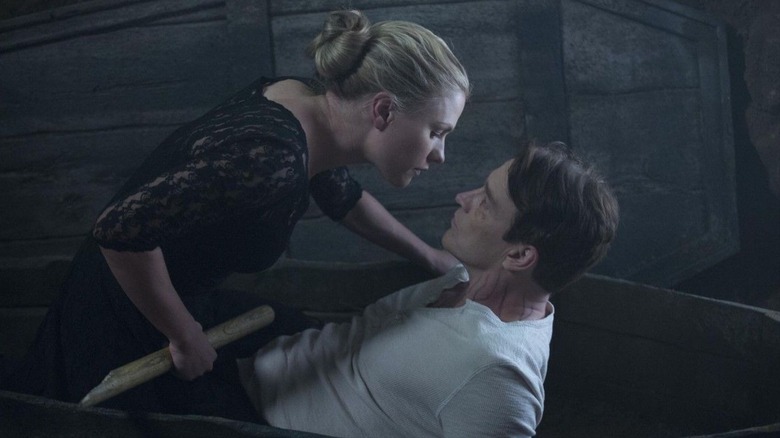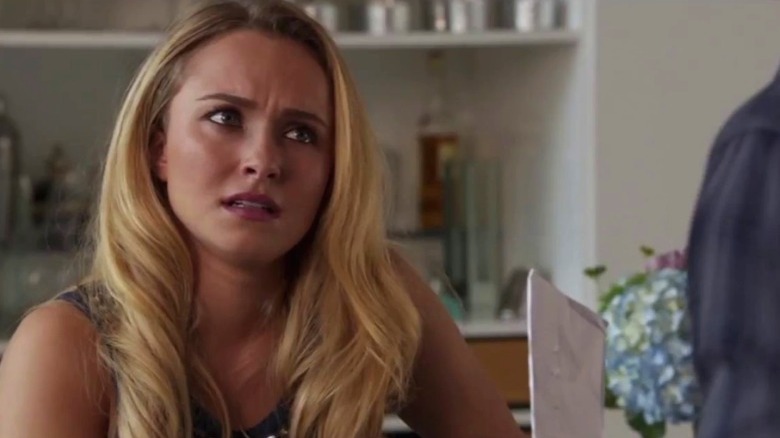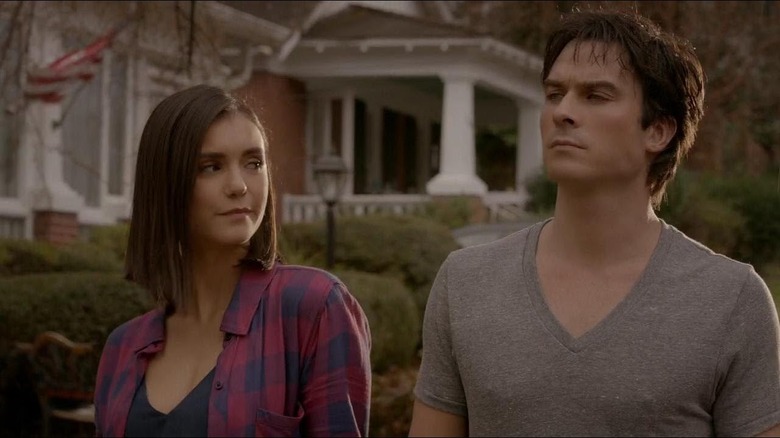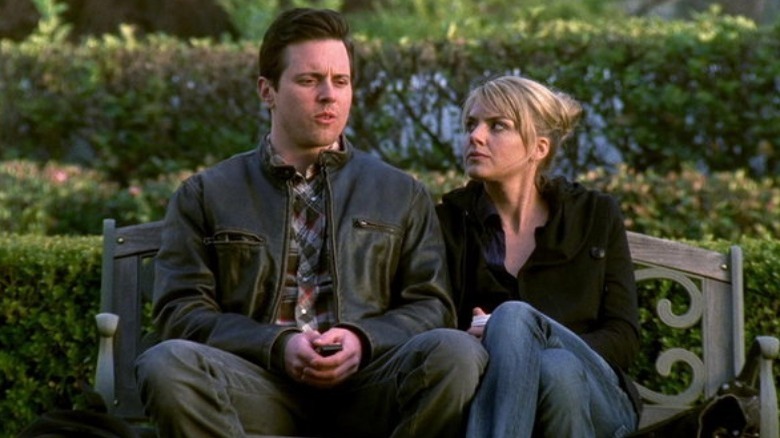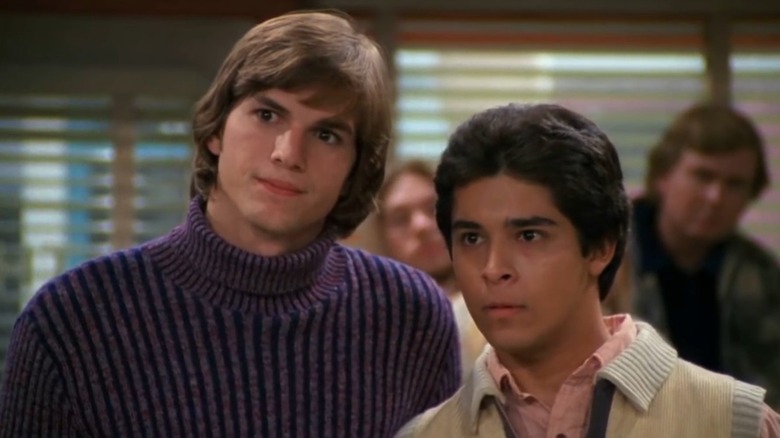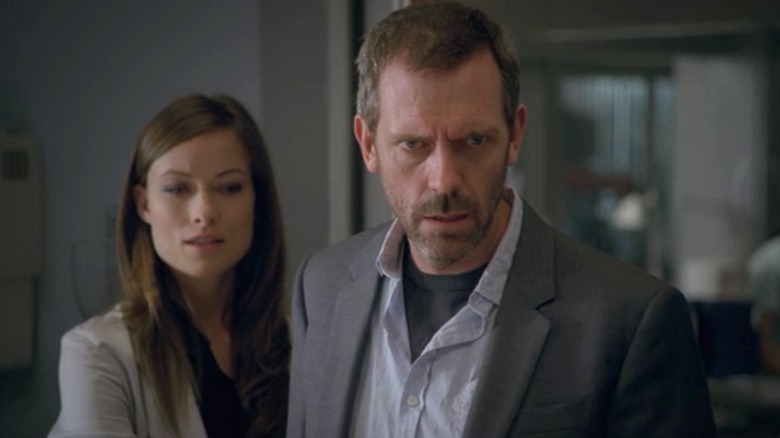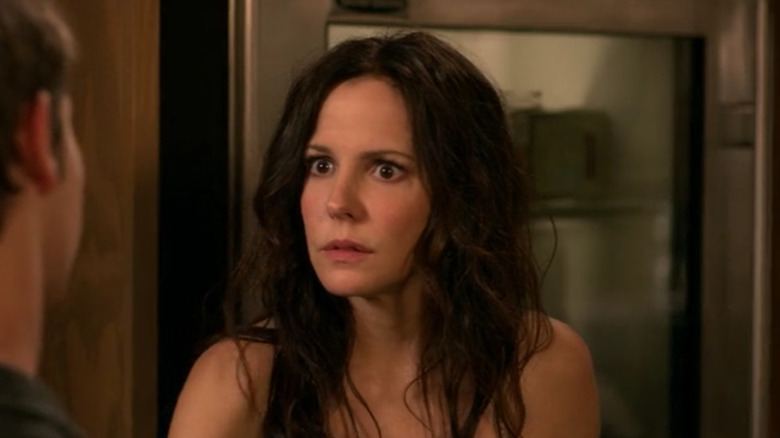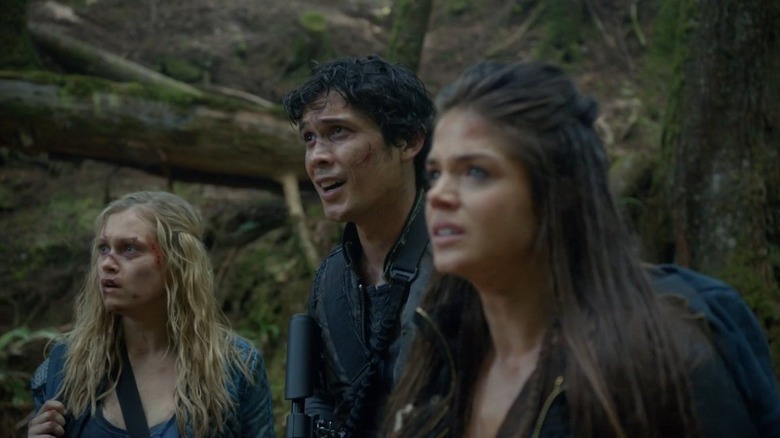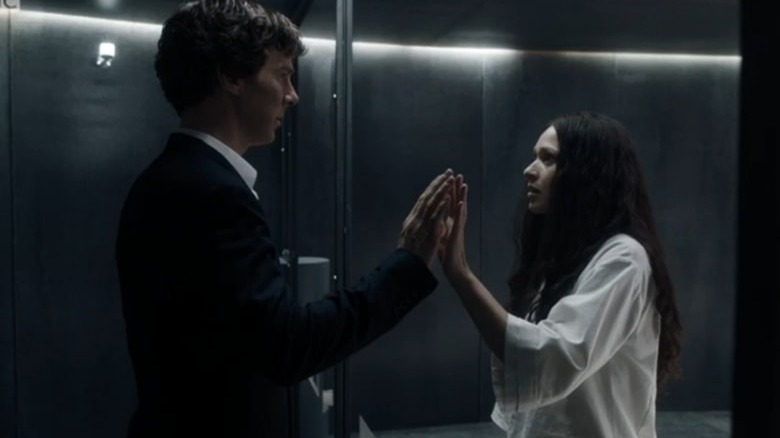It's A Shame These TV Series Ended In A Train Wreck
Do bad finales damage the legacies of good television shows? That's the question an Entertainment Weekly article asked about the finale of the hit sci-fi series "Battlestar Galactica." "When you have access to every episode of countless television shows," the piece reads, "it's natural to want to narrow down the list somehow. See the really great stuff. Skip all the bad stuff. Many viewers naturally just want to know if something's worth it. They want to know if it ends well. While a bad finale doesn't necessarily ruin a good show, if enough people know about it, it can scare them away from said good show."
A bad final episode might not ruin an entire show. Plenty of folks still love "Battlestar Galactica," "Lost," and any other number of shows with poorly received finales. What about when the entire final season is bad? How about if the series ran for multiple seasons and only about half of them were any good? "Battlestar Galactica" is just one of the shows on the following list that covers how a good show can end up a bit of a disaster. Whether it was just the finale that was bad, or the show spiraled out of control for multiple seasons, it's a total shame that these series ended in a train wreck.
Game of Thrones
For a while there, HBO's "Game of Thrones" was a dominant television hit. When it premiered in 2011, it seemed like little more than an adaptation of an obscure fantasy series. However, the show soon proved compelling even for viewers outside of the usual genre fans. "Game of Thrones" soon had devotees identifying with certain houses and rooting for specific characters. The show even maintained its addictive qualities even after killing off some of its most beloved main characters.
This is why it was so disappointing that the final season of "Game of Thrones" was such a train wreck that some don't even recommend newbies watch it anymore. What went wrong with "Game of Thrones"? The show started going off the rails during the last few seasons. Everything seemed rushed, and characters started making decisions that were totally inexplicable. The full train crash came during the last two episodes when the show turned Daenerys, probably the show's most rooted-for heroine, into an insane, city-burning tyrant.
Up to that point, Daenerys had been a survivor, digging her way out of one ditch after another to become the mother of dragons and breaker of chains. So when the show turned her into the bad guy, it all went downhill. The train finally burned to bits when the show then placed Bran Stark on the throne as the new king.
How I Met Your Mother
The CBS comedy "How I Met Your Mother" was an old-school sitcom with a modern twist. The show followed Ted Mosby as he told his kids the story of how he met their mother. Ted spent most of his time with his best friends Marshall, Marshall's wife Lily, their mutual friend Barney, and his on-again-off-again girlfriend, Robin.
The series tried having Ted and Robin get together multiple times, but it never worked out. Then Robin and Barney got together, and their pairing was actually kind of perfect. The series devoted its whole final season to the wedding weekend of Barney and Robin, the same occasion where Ted finally meets the woman he will eventually marry and have kids with — Tracy. It was both sweet and romantic, right up until the final episode threw it all away. After spending the entire last season with Robin and Barney's wedding, the finale reveals that they end up divorced, that Tracy has actually been dead the whole time. To make things even worse, after Ted tells his kids how he met their dead mom, he runs off to tell Robin that he loves her, and they get back together. Trainwreck!
Battlestar Galactica
The "Battlestar Galactica" series that aired from 2004 to 2009 was a reboot of the campy original that turned a silly sci-fi show into a post-9/11 drama that explored military ethics. The series, which followed the last of humanity aboard a fleet of space ships as they battled their robot counterparts, the Cylons, managed to reach a broad audiences thanks to its excellent writing and a consistently strong cast.
However, "Battlestar Galactica" ended up unwinding its own standards. While at first, the show seemed pretty straightforward in its scientific and futuristic roots, the storylines eventually got too bogged down by their mythology. A focus on prophecies, angels, gods, and the show's circular logic that "All this has happened before, and will happen again" drew audiences further from the show they started out watching. Who were the Cylons? Who were the "final five"? What are the visions? Who is running this whole thing? "Battlestar Galactica" basically refused to come up with an answer for any of this and just left it at some sort of God or similar benevolent being. Not only that, but after revealing it was kind of all a deity's fault, the show, which we'd thought was taking place some hundreds of years into the future, actually turned out to be set in the past. Talk about a crash.
Dexter
Showtime's "Dexter" starred Michael C. Hall as a blood splatter analyst for the Miami Police Department's homicide division. However, he also has a secret side gig, as he spends his nights murdering killers lost to the justice system who the police couldn't find, failed to prosecute, or were otherwise never charged. Dexter was a good guy serial killer, if that's a thing, but TV was complicated during the heyday of the antihero.
"Dexter" was a pretty well-loved drama during its run from 2006 through 2013, and Hall earned some accolades, including multiple Emmy nominations and a Golden Globe win. The train wreck aspect comes in during the series finale of "Dexter." When his police officer sister Deb suffers a stroke and is pronounced braindead, Dexter unhooks her from life support and takes her out into the ocean during a storm, leaving her body in the water. He then fakes his death at sea and becomes a lumberjack in Oregon, effectively abandoning his son. Fans were upset that Dexter acts completely out of character, leaves his child, and that the show ends with Dexter becoming a loner lumberjack. According to Vulture, Showtime wouldn't the showrunners kill Dexter, so instead, fans got a truly underwhelming ending. Although, that ending doesn't really mean much since Dexter returns in "Dexter: New Blood," the 10-episode limited series that arrived in 2021.
True Blood
HBO's fantasy horror Drama "True Blood" was based on the "The Southern Vampire Mysteries" series of novels by Charlaine Harris and ran from 2008 to 2014. It starred Anna Paquin as Sookie Stackhouse, a young waitress and telepathic human-faerie hybrid who falls in love with Bill, played by Stephen Moyer, a vampire. The series is set in the bayous of Louisiana and introduces werewolves, witches, and Greek mythology into the mix while it tells a modern story of discrimination, acceptance, and equal rights.
As crazy as True Blood got throughout its seven-season run, and believe us, it got way crazy, how it ended will always be a bit of a disappointment. Bill and Sookie's romance was the backbone of the series and stood the test of time even when absolutely insane things were happening in their home of Bon Temps. So in the finale, when Bill tells Sookie that she has to kill him by staking him through the heart, fans are forced to witness the end of the couple that made the show worth watching. It was a "True Blood" ending that no one really wanted, but at least Eric and Pam ended up being awesome.
Heroes
When "Heroes" premiered on NBC in 2006, it quickly became a hit. The story of the unbreakable cheerleader Claire, the time-traveling Hiro, the flying politician Nathan, and his ability absorbing brother Peter were the stories of everyday people with superpowers. Their comic book-inspired stories intertwine with an overarching plot about the Company, which controls a virus that causes genetic mutations and threatens humanity.
Season 1 of "Heroes" was pretty much a downright masterpiece. Seasons 2 and 3 were solid and watchable, but everything fell apart in Season 4. The show had killed off the real Nathan at the end of Season 4 when actor Zachary Quinto went off to be in more "Star Trek" movies, but the showrunners decided to put his mind inside Sylar and then shapeshift him to look like Nathan. Beyond that, the villains of the final season were a bunch of literal circus freaks whose leader, Samuel, feeds off of superpowered individuals. In the end, Claire repeats her stunt from the pilot, jumping from a great height to prove her rejuvenating strength.
The series ended there and never offered any closure beyond the horrendous circus-themed Season 4. There was a reboot miniseries in 2015 called "Heroes Reborn," which was an adjacent story but still kind of a sequel with different characters. That revival never took off, however, so we're left with a show that had an amazing start and a train wreck of an end.
The Vampire Diaries
The CW's "The Vampire Diaries" was an adaptation of a book series of the same name by author L.J. Smith. While there were only four books in Smith's original set when the series began, "The Vampire Diaries" ran for eight seasons. This meant there were always going to be a lot of new storylines created by the showrunners. However, when the show's lead actor, Nina Dobrev, decided to leave after Season 6, they had to figure out how to move on without their main character, Elena Gilbert.
As a result, the last two seasons of "The Vampire Diaries" were kind of wacky, as they lacked the show's original sparkle and were ultimately kind of a mess. There was a whole season where the bad guys were sirens — yes, those singing mythological creatures that lured people to their deaths. The gang went to Hell, met the Devil, and the characters died and came back left and right. According to an interview with Entertainment Weekly, Dobrev's departure from "The Vampire Diaries" messed up the showrunners' whole plan for how they were going to end the series, leaving Julie Plec and Kevin Williamson scrambling to figure out how to move on. "The Vampire Diaries" should be a lesson in how a show can fall apart once a lead character abandons ship.
Scrubs
If you ever sit down to watch or rewatch the medical comedy "Scrubs," take our advice and skip the last season. The show, which ran from 2001 to 2010, tells the story of Dr. John Michael "J.D." Dorian, a young physician who starts the series as an intern. He works with his best friend, Dr. Christopher Turk, and forms a relationship with Dr. Elliot Reid. The heart-warming comedy dove into serious subject matters while also maintaining a genuine air of hilarity.
Season 8 of "Scrubs" closed with a touching look at J.D.'s last day at the hospital and a look back at his career and the show. Surprising everyone, "Scrubs" returned for a ninth season, which lacked some of the series' original characters and focused on a new set of interns. Whereas almost every episode for the show's previous eight seasons was narrated by J.D., the last season was narrated by newcomer Lucy Bennett. Ultimately, the final season of "Scrubs" focuses too much on new characters that audiences don't care about. While it seems like a valiant attempt at moving on to a new set of interns and doctors, similar to how "Grey's Anatomy" does it, no one really took the bait here.
That '70s Show
"That '70s Show" was yet another series that had to contend with its lead character departing the show, leaving it to find a workaround. While "That '70s Show" was definitely an ensemble comedy, there's no doubt that the show's center was Eric Forman, played by Topher Grace. After all, the 1970s-set sitcom mostly revolved around Eric spending time with his best friends and the love of his life, Donna.
Season 8 of "That '70s Show" was a total mess. With Grace having departed the show for other opportunities, co-star Ashton Kutcher also decided to leave, so he was only around for the first four episodes of the final season but then didn't return until the finale. The last season introduced so many new random characters that they may as well not have even made it. Finally, when the season ended, it was like they never left, with high school sweethearts ending up together in a totally unrealistic and schmaltzy close.
House
"House" was a Fox medical procedural that wasn't boring and repetitive. Okay, maybe it was repetitive, but at least it was interesting and repetitive. The show starred Hugh Laurie as the titular character Dr. Gregory House, an infectious disease specialist, diagnostician, and Head of Diagnostic Medicine at a teaching hospital in New Jersey. Along with a team of three fellow doctors, House, acting much like a medical Sherlock Holmes, cracks mysterious medical cases and solves diagnostic mysteries. However, House is, well, kind of a jerk. His addictions and general distrust of anyone, along with his inability to harbor any empathy for his patients, make him a typical anti-hero of this 2000s drama.
In Season 4, after his three colleagues quit, another three join his team. However, House ends up alone and miserable, having learned nothing from these six students, his best friend Dr. James Wilson, or his romantic interest, Dr. Cuddy. The reason why "House" ended so poorly comes down to the fact that it resolves its story in much the way "Dexter" did, with House faking his own death. It seemed like a cop-out and was not in character for a guy who just can't keep away.
Weeds
At this point, it's kind of quaint to look back on a show about a suburban mom who sells pot on the sly after the death of her husband. If "Weeds" were made today, it would probably be about a suburban widow opening her own legal marijuana dispensary instead of trying to make it as a big-time drug dealer. "Weeds" starred Mary-Louise Parker as Nancy Botwin, a California mom of two boys whose small-time pot business gets bigger and crazier, while the men surrounding her just come along for the ride.
"Weeds" was great for the first few seasons, but as it got increasingly ridiculous, wilder, and darker, it kind of went downhill. During that time, Nancy, as Uproxx describes, "went from anti-hero to sex villain: She married the mayor of Mexico City, who was also the leader of a drug cartel. She was responsible for a lot of people's deaths. Hell, even her son, Shane, killed someone. Nancy turned into a horrible, uncaring mother, and a pretty terrible all-around person. She neglected her family." Yet, for everything awful that Nancy did to people throughout the entire series run, she didn't get any comeuppance in the end. Instead, she got a happy ending by selling her company to, of all things, Starbucks.
The 100
The CW's "The 100" is yet another science fiction series that got away from itself and its roots. The series starts as a teen drama that takes place in a future where 100 juvenile delinquents are sent back down to Earth after humanity has been floating in orbit for a century after a nuclear apocalypse. The kids are sent as lab rats to see if the Earth has become habitable again, but they discover that people have been living down there the whole time. The teens eventually realize that a new society has formed, and they are the invaders.
Throughout the series, the titular 100 creates a new society, interacts with the Grounders, and fights the Mountain Men. After that, they establish a paradise, blow up the Earth again, and go underground into a bunker. However, the final two seasons shoot the remaining cast members hundreds of light-years across the galaxy to a new planet where humans from Earth had reincarnated themselves into new bodies. Finally, the last season throws all of that away and introduces a new alien species in charge of space-traveling orbs and are supposed to help humanity "transcend," whatever that meant. On top of that, they threw in a backdoor pilot for a prequel that no one understood. Sci-fi can be fun when it takes storytelling risks, but these leaps were too far out of whack.
Sherlock
The BBC One mystery series "Sherlock" stars Benedict Cumberbatch as famed detective Sherlock Holmes and Martin Freeman as his assistant, John Watson. The series has short seasons with extended episodes, as each is composed of three 90-minute adventures. There were also two specials thrown in, with one set in Victorian London, author Sir Arthur Conan Doyle's original setting. The modernized take on the classic characters was compelling, twisty, and addicting to watch, mainly because of the camaraderie and chemistry between Holmes and Watson.
However, Season 4 of "Sherlock" ended rather confoundingly, leaving fans both confused and annoyed, especially considering that it doesn't seem like anymore "Sherlock" is coming. While each episode of the series was based on one of Doyle's "Sherlock Holmes" novels, the Season 4 finale, titled "The Final Problem," didn't actually use the story from the book "The Final Problem." Instead, the last episode introduces a long-lost, sociopathic Holmes sister named Eurus, whom Sherlock has erased from his mind, and Mycroft has been keeping a secret. The twists and mysteries here were much more unbelievable than in previous episodes, and Sherlock's mystery sister feels like a cop-out, distracting from many of the other unresolved issues surrounding Holmes and Watson. The sad part is it's unclear if there's going to be a Season 5 of "Sherlock," as Cumberbatch and Freeman have since become uber-famous and are not often available. So if that really was the end of "Sherlock," it's pretty disappointing.
